Universal Salvation by Grace, Right! But, what about Hellfire?
ST 4124 Afterlife 14
 God’s saving grace is universal. Right? No one is excluded. Right? No, that’s not right. At least if you have a TULIP app on your cell phone. What’s TULIP Calvinism? It’s an acronym for:
God’s saving grace is universal. Right? No one is excluded. Right? No, that’s not right. At least if you have a TULIP app on your cell phone. What’s TULIP Calvinism? It’s an acronym for:
I guess if you confess Limited Atonement, then saving grace is not universal. Mmmmm? My head is beginning to spin.
Let’s jump from TULIP to eschatology. What does TULIP imply? It implies double destiny. Some of our best friends are destined to eternal perdition. Some of our other friends are destined to eternal felicity. Where does this leave you and me? We’ll let God answer that.
In what follows we’ll absorb the hard punches beating up on the traditional Christian view of double-destiny. Accordingly, saved persons are resurrected into everlasting bliss. Yet, accordingly, unrepentant souls burn everlastingly in hellfire. [Eschatology]
No defense needed. In what follows, as a systematic theologian, I’ll interpret the relevant Scripture passages and then make a case for universal salvation. I will supply two systematic arguments on behalf of the universalist interpretation of the Bible. They will be the theodicy argument and the sympathy argument.
Matthew Distefano’s 3 Terrifying Questions
Progressive Christian and Patheos blogger Matthew Distefano has an uncanny yet profound way of posing illuminating questions. He poses the kind of question that makes us squirm and look the other direction to avoid confronting them. For the critically thinking Christian, however, these questions must be faced. No turning the other cheek here. So, it’s time to face them.
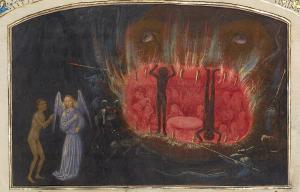 In a recent post, “3 Questions for Annihilationists,” Distefano tells us he watched filmmaker Kevin Miller’s “Hellbound.” After viewing this documentary, Distefano decided to complicate the traditional antinomy regarding what happens to us after death and judgment. Instead of a simple binary—either double destiny or universalism—Distefano says we must choose between three alternatives. What are they? [Hell in Dante’s Inferno]
In a recent post, “3 Questions for Annihilationists,” Distefano tells us he watched filmmaker Kevin Miller’s “Hellbound.” After viewing this documentary, Distefano decided to complicate the traditional antinomy regarding what happens to us after death and judgment. Instead of a simple binary—either double destiny or universalism—Distefano says we must choose between three alternatives. What are they? [Hell in Dante’s Inferno]
First, infernalism. This is what we traditionally called “double destiny.” Some go to heaven. Some go to hell. Hell is like an everlasting inferno. The fire is hot. The very idea of hell scares the hell out of me.
Second, conditional immortality. Some are annihilated. Others are granted immortality. No need to get anxious over the annihilated. The dead don’t experience any loss. Only oblivion.
Third, universalism. Or, more traditionally, universal salvation. All will rise. All will pass through the judgment, because Christ has taken our judgment unto himself. All will be redeemed. Progressive Christians and, of course, universalists like this alternative.
Fourth, limbo. Oh, wait a minute! That’s not on Distefano’s list. But, it is on the list of evangelical sockdologer Roger Olson. Olson attends to subterranean theology. What’s that? Dogmatic items belonging to the tradition but not Scripture. On that list we find limbo. Limbo, says Olson, is “an idea first proposed by church father Augustine to name a place where unbaptized infants go when they die. It is sort of like a state of suspended animation, neither heaven nor hell and not even purgatory.” Perhaps limbo could be added to double destiny. Triple destiny?
Electing an Answer
Which of these should we elect? Oh, wait. If God is responsible for unconditional election…. Ooops! That’s misleading. Or, is it?
If we must elect one of these three, we need to examine our sources. For the Methodists among us those sources are four in number: Scripture, Tradition, Reason, and Experience. Now, does Calvin’s Institutes count as Scripture or Tradition? The Augsburg Confession? Just kidding.
Distefano goes back to Scripture. But what he finds in Scripture is a long list of passages that support all three alternatives. That’s right. The Bible is not of one mind on this eschatological question. There’s variety. The biblical authors did not take a seminary level course in systematic theology.
I admire the fact that Distefano admits how he reads the Bible selectively. He elects those passages which agree with the position he’s already taken in systematic theology. That kind of honesty is well worth applauding. I’ll comment on this further below.
Interpreting the Symbolic Discourse of Holy Sculpture
Frankly, it is the Bible that confronts us with these challenging questions. The symbolic discourse of Holy Scripture evokes more meaning than we can rationally discern, to be sure. So, for the systematic theologian or the constructive theologian to iron out the wrinkles of apparent alternative notions risks over-simplifying what God’s Word is telling us. Even so, let’s try. We’ll begin by acknowledging that the Bible seems to tell us apparently incompatible things.
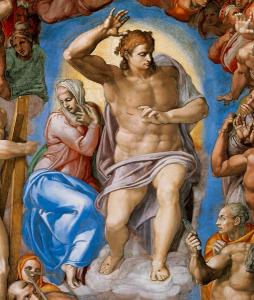 First, faith-based infernalism. The New Testament seems to say that salvation will apply to some people and not others on the grounds that one must have faith in order to be saved. Only some people have faith while others obviously do not. Saint Paul says salvation is for “everyone who has faith” (Rom. 1:16). And the oft-quoted John 3:16 says eternal life is given to those who believe in Jesus. [Michelangelo’s “Last Judgment” in the Sistine Chapel]
First, faith-based infernalism. The New Testament seems to say that salvation will apply to some people and not others on the grounds that one must have faith in order to be saved. Only some people have faith while others obviously do not. Saint Paul says salvation is for “everyone who has faith” (Rom. 1:16). And the oft-quoted John 3:16 says eternal life is given to those who believe in Jesus. [Michelangelo’s “Last Judgment” in the Sistine Chapel]
So, we just might ask: what happens to those who do not have faith? Do such passages imply that those without faith are condemned to everlasting perdition? If so, then atonement is limited. Salvation is by no means universal. Some of our friends-without-faith will experience hellfire.
Second, works-based infernalism. This means our destiny is decided by works, choices, merits. It is clearly articulated in some passages that salvation is dependent upon the virtuous works we perform. The most forceful statement of this position is Jesus’ parable of the last judgment in Matthew 25. The sheep are separated from the goats. What is the criterion? Love of neighbor is the criterion. The neighbor-loving saved sheep go to the right hand of the Son of man because they visited the sick and imprisoned and gave food and drink to the hungry and clothes to the destitute. The goats who failed to love their neighbors in this way follow the direction the left hand is pointing. It points to everlasting hell. Faith and belief are not mentioned in this passage. Only good works determine if a person goes to heaven or not.
Third, grace-based-universal salvation (Peters 20 5, Chapters 11,12). Numerous passages tend to support the position of universal salvation. These emphasize that salvation is dependent upon God’s grace and not human works. Therefore, all conditionalism is precluded. Paul repeatedly emphasizes that we are saved by grace. “It is the gift of God” (Eph. 2:8; Rom. 3:24). Progressive Patheos columnist Keith Giles lists 76 Bible passages that support universal salvation.
He’re the main point: God’s grace is universal. It knows no bounds. Christ “died for all” (2 Cor. 5:15), “so all will be made alive in Christ” (1 Cor. 15:22). How should we interpret this “all”? Does it refer to everybody? To those without faith as well as the faithful? To non-Christian as well as Christian? It would seem to. “The act of righteousness of one leads to acquittal and life for all” (Rom. 5:18; ILL).
In sum, the Bible gives the systematic theologian apoplexy. It appears that we have three irreconcilable positions within the New Testament. Whether we are granted everlasting salvation depends on (1) whether or not we have faith; (2) whether or not we love our neighbor with works; or (3) neither of the above, because salvation is totally a free gift of God’s grace and hence cannot be earned by anything we do. Are these three positions just three different ways of saying the same thing? Or, is there a real incompatibility here? Unfortunately for the systematic theologian, the differences seem to run deep. Certainly these three approaches as they stand could not be taken up into a theological system without introducing inconsistency and incoherence. What shall we do?
We’ll start by listening to criticisms of infernalsim. Then, we’ll look at the merits of universalism.
Criticisms of Infernalism
Why does the current religious mood reject double destiny with its infernalism? Because it makes God look mean and because it makes the church look self-serving.
What kind of God would relish watching everlasting agony experienced by unelected sinners writhing in the inferno? Even if their punishment is just, the metaphysical scope of punishment is outlandish. Why should a temporal sin result in an eternal punishment? That’s disproportionate. Is our God disproportionate?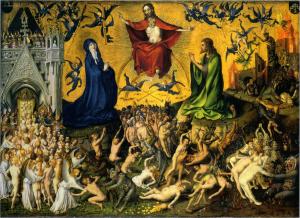
Infernalism, say critics, betrays a self-serving elitism on the part of the church. Is church membership the ticket to heaven? Must you buy your ticket by saying, “I believe,” in order to avoid hellfire? [Last Judgment by Stefan Lochner, 1535]
Today’s egalitarians take aim at Christian churches for narrow-mindedness. The bullseye is the doctrine of extra ecclesiam nulla salus (no salvation outside the church). Such criticism appears pertinent from time to time when Eastern Orthodoxy, Roman Catholicism, or some Protestant denominations claim excessive authority and closely identify themselves with the church that the slogan comes to read: no salvation outside our denomination. This attitude puts a human institution in the position of doing Christ’s work of saving people.
Philosopher of religion John Hick vociferously opposes the traditional Christian doctrine of hellfire, which he says “is as scientifically fantastic as it is morally revolting” (Hick 1976, 199).. Hick opposes the very concept of a double destiny and the history of exclusivism and religious discrimination that he believes are produced by it.
Just what is salvation, anyway?
Just what is salvation anyway? Can the church pass it out or withhold it? If salvation is a gift of grace, what does that mean?
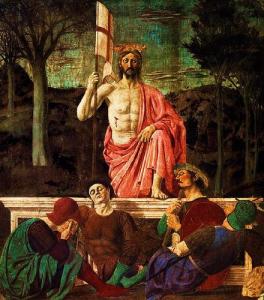 The Christian understanding of salvation emerges from the compact symbol of the gospel itself. In brief, salvation consists in Christ’s forgiveness of sins and the gift of a transformed and renewed life in the kingdom of God. “Salvation in the New Testament is what God has done to death in the resurrection of Jesus,” writes theologian Carl Braaten. Salvation includes resurrection from the dead. “The gospel is the announcement that in one man’s history death is no longer the eschaton, but was only the second-to-last thing. . . . Our final salvation lies in the eschatological future when our own death will be put behind us” (Braaten, The Person of Jesus Christ 1982, 1:566). [Resurrection by Pierro della Francesca]
The Christian understanding of salvation emerges from the compact symbol of the gospel itself. In brief, salvation consists in Christ’s forgiveness of sins and the gift of a transformed and renewed life in the kingdom of God. “Salvation in the New Testament is what God has done to death in the resurrection of Jesus,” writes theologian Carl Braaten. Salvation includes resurrection from the dead. “The gospel is the announcement that in one man’s history death is no longer the eschaton, but was only the second-to-last thing. . . . Our final salvation lies in the eschatological future when our own death will be put behind us” (Braaten, The Person of Jesus Christ 1982, 1:566). [Resurrection by Pierro della Francesca]
Salvation is cosmically inclusive. “Salvation is a relationship in three dimensions: with God, with other humans, and with the rest of creation,” says S. Mark Heim (Heim 2001, 75). Salvation is not limited to human kind or even planet Earth, but to all that belongs to creation.
We can’t leave out our doggies and kitties. Eco-ethicist Cynthia Moe-Lobeda provides an inclusive vision of salvation. “Ultimately, salvation entails the restoration of the entire created world to one in which none flourish by degrading others or otherkind” (Moe-Lobeda 2013, 59). Our own human salvation is part of God’s redemption of all creation symbolized in Scripture as the kingdom of God or the new creation.
Re-asking the Question of Universal Salvation
Now, let’s turn to universalism. Might the position of universal salvation as a gift of divine grace provide the most adequate theological explanation? Affirming universal salvation would count as the hypothesis of a systematic theologian making an interpretation of Scripture with focus on sola gratia, by grace alone.
This does not mean that either I or Distefano neglect Bible passages we don’t like. Rather, formulating doctrine requires hypothetical try-ons when interpreting God’s Word. Like constructing a Lego model of the neighbor kid’s red wagon, the systematic theologian needs to make an array of different parts fit together. So, let’s get to it.
More specifically, I suggest that a focus on sola gratia—a focus on divine love and grace–would lead to offering two complementary hypotheses or arguments. They are the theodicy argument and the sympathy argument.
The Theodicy Argument
Let’s start with the Theodicy Argument on behalf of universal salvation and the end to hell. Accordingly, salvation will be universal—that is, salvation has been given in Christ and will be applied to all human beings regardless of their sinful behavior on earth. By implication, then, hell cannot last forever. Even if hell exists now, it will be only temporary. Only God’s kingdom is everlasting. Why does evangelical explication lead in this direction?
Two attributes of God are called into question by the theodicy issue, namely, God understood as both all-powerful (omnipotent) and all-loving (omnibeneficent). If God is all-powerful, then the forces of evil cannot have ultimate power. If hell or hades represents the domain of the devil, and if this domain is understood as the kingdom of evil standing over against God, then it cannot be as enduring as the kingdom of God. If hell were to remain forever, it would also remain as a constant reminder that God’s will is not completely done. An everlasting hell would testify that God’s power is less than complete. Unless God’s kingdom is universal and all-inclusive, God is not all-powerful. Therefore, hell, if it exists, must be temporary. And once it passes out of existence all will be taken into the consummate kingdom of God.
Now, an infernalist might counter: what if we think of hell not as the domain of the devil that exists contrary to the will of God. But, rather, let’s think of hell as existing under the domain of divine power itself? What if we think of hell as God’s means for executing retributive justice? What if we think of hell as God’s left hand at work?
To counter this counter, we would then have to ask what it means to say that God is all-loving or omnibeneficent. This divine love is understood by the Christian gospel to apply even to sinful people, even to those who have not loved God in return, even to those deserving of hell. “Christ died for the ungodly” (Rom. 5:6). Grace and forgiveness, not hell, is for the ungodly.
Hence, God’s love is expressed in terms of mercy, grace, and forgiveness. If God’s love is capable of extending grace and forgiveness even to those most detestable to God, then it seems that this love would effect the elimination of hellfire. Thus, to posit that God uses omnipotent power to establish a place of everlasting torment and suffering as retribution for sin would appear to draw a limit to this gracious loving.
The Sympathy Argument
Next, the Sympathy Argument on behalf of universal salvation. Imagine that you are one of the elect. You now reside in heaven. When you walk to heaven’s balcony rail and look over, what do you see? You see your friends down below. They are in hell. They suffer agony in the fire’s heat.
![]() What do you feel? Well, if you love your reprobate friends, then you feel sympathy or empathy. You feel their pain. Suddenly, because of your sympathetic pain, we have pain in heaven. Heaven is no longer painless. And the reason you feel this sympathetic pain is that you love the sinner and the sufferer and the rejected just as God loves them.
What do you feel? Well, if you love your reprobate friends, then you feel sympathy or empathy. You feel their pain. Suddenly, because of your sympathetic pain, we have pain in heaven. Heaven is no longer painless. And the reason you feel this sympathetic pain is that you love the sinner and the sufferer and the rejected just as God loves them.
This argument from sympathy begins with the nature of love and the New Testament observation that “we love because [God] first loved us” (1 John 4:19).
One of the significant characteristics of both divine and human love is sympathy. Combining syn (σύν) with pathos (πάθοϛ), the word sympathy means feeling someone else’s pain with him or her. The precedent begins with God. Yahweh of Israel saw the sufferings of the chosen people in Egypt and “heard their cry” (Exod. 3:7) and responded with the Exodus deliverance. So also Christians believe God has responded to the sufferings of the whole world by sharing in them through Jesus’ sufferings, and by using such sufferings as a means of deliverance. To love is to feel the pain of the other. To feel someone else’s pain is to be pained in oneself. And we cannot be released from sympathetic pain until healing has occurred. Just as God so loved this world (John 3:16), so also do those who love God groan in travail (Rom. 8:22) in behalf of the healing of all things. This is the interconnectedness and wholeness of things coming to expression through sympathetic love. Love will not rest from sympathetic suffering until all things are made whole.
The pair of arguments I am suggesting here does not try to answer the question of whether hell exists now or not. I hypothesize that if hell does exist then it belongs to an interim period prior to the consummation. Certainly Jesus and the New Testament writers assumed that hell does exist.
My point here is that one path evangelical explication can take is toward the position that hell, if it does exist, cannot last forever and that salvation is for the whole of God’s creation. The power and love of God would forbid the everlasting existence of hell. For textual evidence, one can cite the dramatic conclusion of the Apocalypse of John where the devil, death, and hades itself are all destroyed when they are thrown into the lake of fire (Rev. 20:14). Perhaps this is a vivid way for the New Testament to make the point that when the kingdom of God arrives in its fullness, there will be no more room left for hell.
Now let me repeat a methodological caution mentioned earlier. The hypothesis regarding universal salvation is just that, a hypothesis. It is not dogma. It is an attempt to explicate evangelically the New Testament symbols. But in pursuing this line of theological reasoning I have never ceased to be aware that some other biblical texts seem to lead in another direction, in the direction of an everlasting double destiny.
Apocatastasis Again
 To be more precise, the hypothetical position I suggest here is a form of an ancient doctrine that has often been repudiated, namely, apocatastasis (ἀποκατάστασιϛ). This view holds that Satan and all sinners will ultimately be restored to God. In both the patristic era and our own time apocatastasis has been rejected. But, when it is rejected, curiously enough, there seems to be considerable pussyfooting around it. [Resurrection by Carravaggio]
To be more precise, the hypothetical position I suggest here is a form of an ancient doctrine that has often been repudiated, namely, apocatastasis (ἀποκατάστασιϛ). This view holds that Satan and all sinners will ultimately be restored to God. In both the patristic era and our own time apocatastasis has been rejected. But, when it is rejected, curiously enough, there seems to be considerable pussyfooting around it. [Resurrection by Carravaggio]
Reformed theologian Karl Barth argues, on the one hand, for the universal saving work of Jesus Christ for all persons while, on the other hand, Barth will not permit us to say that God’s salvific intention will “finally be coincident with the world” (Barth 1936-1962, 2/2:417). Barth will say yes without equivocation to the universality of God’s grace. But the answer to the question of universal salvation he consigns to divine mystery.
Roman Catholic theologian Karl Rahner waffles in a similar fashion. In his article on hell in Sacramentum Mundi he takes a firm stand against apocatastasis. But in his Foundations, where the weight shifts a bit toward universalism, Rahner shrinks from positively endorsing double destiny. He says that “the existence of the possibility that freedom will end in eternal loss stands alongside the doctrine that the history of the world as a whole will in fact enter into eternal life with God” (Rahner 1978, 444).
Now, one could sharply criticize Barth and Rahner on systematic grounds for lack of consistency and coherence, for their inability to bring universal grace and double destiny together. But it is not the fault of the systematicians here. The ambiguity lies in the biblical symbols themselves. And, this ambiguity continues to be reflected in the systematic yet faithful explication of those symbols.
Does apocatastasis eclipse human freedom?
There is more. Freedom lovers raise a systematic objection to apocatastasis. Does universal salvation require coercion? Does it require that some souls be saved against their will? Could you or I insist against God’s grace that we prefer Satan, hell, fire, and perdition? Shouldn’t human freedom get the last word? Yes, if you’re Patheos blogger Leah Libresco. She says a coercive grace sounds like “domination and destruction.”
In another Patheos post, Richard Beck tries to resolve the tension between divine coercion and human freedom by giving time for divine persuasion to win over the recalcitrant sinners. “Finally, at the end of this process, simple natural consequences bring about repentance, change, and virtue. Again, no force is used. All that is needed is time.”
In still another Patheos post, “Struggling with Apocatastasis,” Pascal Emmanuel Gobrey trumpets, “There is literally nothing you can do to separate yourself from God’s grace.”
When pressed to support apocatastasis, I think I elect God’s grace over any extreme support of human free will.
Conclusion
Talk about eternity from within time is risky for the systematic theologian. “Theology’s lure is eternal truth, while time is its crisis.,” warns theologian Christine Helmer at Northwestern University (Helmer 2014, 11). Yet, that’s what we’re trying to do here.
After acknowledging that the Bible gets us into trouble by spraying us with apparently incompatible destinies, I recommend we consider universalism to be the most adequate theological explanation. Especially in the form of apocatastasis.
Should this become slam-dunk dogma? No. It’s merely a tenable and reasonable explication of what Scripture says. It is also consistent with what we believe to be true about God. God is gracious, loving, and forbearing.
▓
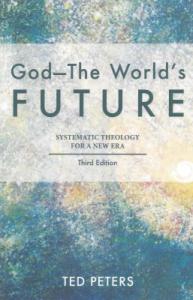 Ted Peters is a Lutheran pastor and emeritus seminary professor. He is author of Short Prayers and The Cosmic Self. His one volume systematic theology is now in its 3rd edition, God—The World’s Future (Fortress 2015). His book, God in Cosmic History, traces the rise of the Axial religions 2500 years ago. He has undertaken a thorough examination of the sin-and-grace dialectic in two works, Sin: Radical Evil in Soul and Society (Eerdmans 1994) and Sin Boldly! (Fortress 2015). Watch for his forthcoming, The Voice of Christian Public Theology (ATF 2022). See his website: TedsTimelyTake.com.
Ted Peters is a Lutheran pastor and emeritus seminary professor. He is author of Short Prayers and The Cosmic Self. His one volume systematic theology is now in its 3rd edition, God—The World’s Future (Fortress 2015). His book, God in Cosmic History, traces the rise of the Axial religions 2500 years ago. He has undertaken a thorough examination of the sin-and-grace dialectic in two works, Sin: Radical Evil in Soul and Society (Eerdmans 1994) and Sin Boldly! (Fortress 2015). Watch for his forthcoming, The Voice of Christian Public Theology (ATF 2022). See his website: TedsTimelyTake.com.
▓
Works Cited
Barth, Karl. 1936-1962. Church Dogmatics, 4 Volumes. Edinburgh: T&T Clark.
Braaten, Carl. 1982. “The Person of Jesus Christ.” In Christian Dogmatics, 2 Volumes, by eds Carl E Braaten and Robert E Jenson. Minneapolis MN: Fortress Press.
Heim, Mark. 2001. The Depths of the Riches: A Trinitarian Theology of Religious Ends. Grand Rapids MI: Eerdmans.
Helmer, Christine. 2014. Theology and the End of Doctrine. Louisville KY: Westminster John Knox.
Hick, John. 1976. Death and Eternal Life. New York: Harper.
Moe-Lobeda, Cynthia. 2013. Resisting Structural Evil. Minneapolis MN: Fortress Press.
Peters, Ted. 2015. God–The World’s Future: Systematic Theology for a New Era. 3rd. Minneapolis MN: Fortress Press.
Rahner, Karl. 1978. Foundations of the Christian Faith. New York: Seabury Crossroad.














